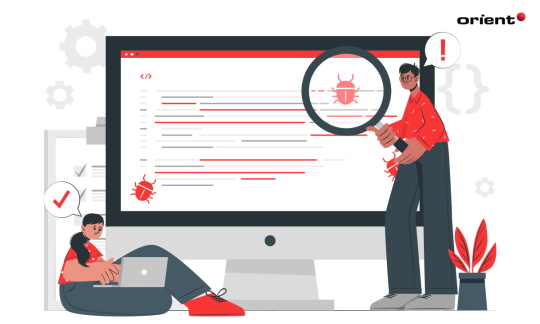
Managed Testing Service & How It Benefits Your Business

Content Map
More chaptersThe importance of software testing and quality assurance in the software development life cycle is beyond debate. Testing must be done throughout the software development process to ensure that the final product is error-free and adheres to the necessary standards before it makes its way into the hands of the end-user. Moreover, it helps to make sure the product will roll out timely enough to penetrate the market, helping your business to achieve the objectives and seamless continuity.
However, the desired standards of quality for their software product are met with a number of challenges, such as inadequate in-house testing expertise, lack of time and resources, pressure to deliver the product to market quickly, etc. However, the biggest problem standing in their way of reaching their quality objectives is typically a budgetary one.
That’s why a lot of IT businesses struggling in the midst of accomplishing the testing activities and trying to minimize the expenses go for a more cost-effective solution for software testing that can finish the job done without compromising on quality or busting their IT budget – Managed testing services and managed QA services.
What Is the Concept of Managed Testing Service?
By definition, managed software testing services, simply known as managed testing services (MTS), refers to delegating software quality assurance and testing processes to an external team of experienced test engineers who work with your development team throughout the software development life cycle to ensure that your end product meets all quality standards.
Businesses prefer to outsource testing solutions to third-party quality engineering vendors due to a variety of reasons, which are not the same. While they vary case by case, the primary objective of managed testing services is to relieve their internal team from the load of test execution and management, which may not be in their expertise, so that they can concentrate on their core business processes and leave the testing to the professionals. Otherwise, the majority of businesses decide to outsource primarily to avoid paying for in-house QA teams and testing expenses.
With an extensive test management infrastructure and years of experience in managing testing processes for a wide range of software applications, MTS providers are better equipped to handle all aspects of software testing, right from test planning and execution to defect management and tracking. Also, an MTS team can offer mature testing processes that cover a wide range of methodologies and types of software testing, such as manual testing, automated testing, performance testing, security testing, etc., and can be fully customized due to the specific test strategy of your project.
Benefits of Managed Testing Services
Outsourcing testing services poses both pros and cons. However, the competitive advantages do outweigh the disadvantages. Here is a list of benefits that your business gains by opting for MTS:

Save Testing Costs
When outsourcing testing services, you can cut down to 30% or even more on the overall testing costs. As you delegate all the testing activities to an external team of test engineers, you don’t have to invest in building and maintaining an in-house full-fledged QA team as well as in infrastructure and necessary tools any longer. All these costs are now borne by the MTS provider. Thanks to the flexible pricing model, you – the MTS clients – are only billed for the actual services rendered by the provider and not for the time spent by their resources, whether on-site or off-shore. Moreover, by outsourcing your testing needs to an MTS provider, you are able to tap into the pool of top IT talent at a fraction of the costs. Otherwise, you may be unable to afford to employ them full-time.
Extensive Testing Expertise & Resources
When you outsource your testing processes to MTS providers, you earn access to their expertise, experience, and resources, which will otherwise be unavailable to you. An MTS team comprises experts who have worked on a wide range of projects with different clients across various industry verticals and are well-versed in the latest testing trends, tools, and methodologies. Therefore, such a team can offer you their rich expertise in technology and QA domain that help you build a high-quality product within the given timeline. Moreover, they also have more mature testing processes, which assist them a lot in providing an unbiased perspective on the quality of your software product, as well as suggesting continuous improvement at every stage of the software development process. With greater transparency along the SDLC, you have a higher chance to make sure that your final product is flawless and up to the mark. In addition, managed testing services are also an optimal solution to cope with the shortage of IT specialists in case you require more staff for your existing team.
Faster Software Delivery
Time-to-market is one of the keys to keeping your product afloat in such a highly competitive technological marketplace and managed testing services are proven to facilitate faster delivery. As MTS providers follow an agile methodology and they are capable of deploying the required resources on your project, they can get started with the testing activities right away and deliver the software product within the stipulated time frame. In addition, the MTS team will continuously monitor the testing activities and keep track of the software development process so that they can quickly adapt their test processes as per the changes in requirements and deliverables. Moreover, when having a third-party vendor manage the end-to-end testing function for you, you have free hands to devote time and resources to the core business expertise and work on technological innovation for the product.
Responsive & Flexible Testing Team
The best thing about outsourcing a testing team compared to owning an in-house one is that it can scale up or down to the ever-changing requirements of the project over time. This keeps your testing team lean and operates in an agile manner. Furthermore, MTS teams are highly flexible and can collaborate with your in-house team as an extension of your project. The outsourced teams are also responsive to the client’s needs and can quickly adapt to the changes. This flexibility helps businesses rapidly respond to market changes and achieve their desired goals in a shorter time frame.
Secure Quality of the Software Product
When you outsource testing to an external team of experts, they will not only test your product but also help you assess the risks associated with its release. These professionals have a lot of experience working on projects with different clients and across various domains. Therefore, they are well-versed with all the nitty-gritty details of software development as well as testing. They know what challenges might pop up at what stage of the software development process and how those can be tackled most effectively. As a result, by strictly following a well-defined process, they can help you improve the quality of your software product.
Customized Testing Solutions
As every business is unique, so are its requirements. One size does not fit all when it comes to software testing. That’s where managed testing services come into play. These testing services can be customized as per the specific needs of your project and business goals. The MTS team will work closely with you to understand your project requirements and then suggest a custom-made solution to help you achieve your desired results within the given timeline.
Better Project Tracking & Reporting
MTS providers use state-of-the-art tools and technologies to track the progress of your project and generate reports at regular intervals so that you are able to capture a clear picture of what’s going on. These reports are not only useful for getting insights into the project but also for making better business decisions. In addition, MTS teams use advanced issue tracking systems to keep track of all the issues raised during testing and their resolution status. This helps you identify potential risks early on and take corrective measures before they impact the quality of your software product.






